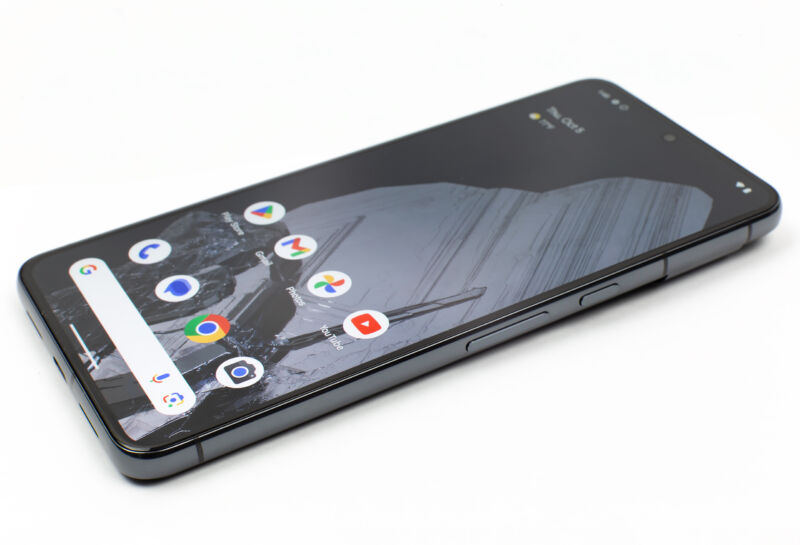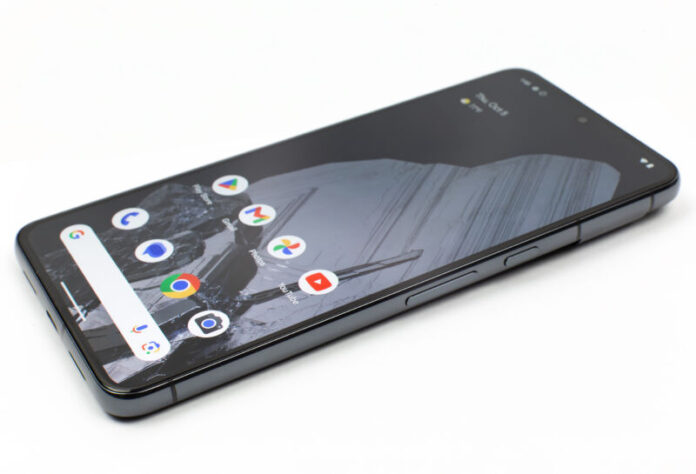
Enlarge / Behold, the glorious, flat display. Normal, common-sense phone design is back, finally! (credit: Ron Amadeo)
Google is listening. Reviewing phones means that we usually complain—a lot—about phone designs, about things that could be better, and about decisions that don't make a ton of sense. Usually it feels like talking to a wall; manufacturers ignore us and keep doing whatever they want.
The Pixel 8 is different, though. This phone feels like it's taking some of our long-standing pet peeves into account and is finally doing something about them. Tired of pointless curved screens that distort your image? Fixed. Want an update support timeline that finally rivals iOS? Check. Fixing flaws with the previous model, like face unlock? Double check. Compared to where the Pixel line was just a few years ago, Google Hardware is turning in phones that are polished, practiced, and full of great decisions.
The Pixel design just keeps improving
-

The Pixel 8 Pro display looks great. [credit: Ron Amadeo ]
| SPECS AT A GLANCE | ||
|---|---|---|
| Pixel 8 | Pixel 8 Pro | |
| SCREEN | 6.2-inch, 120 Hz, 2400×1080 OLED | 6.7-inch, 120 Hz, 2992×1344 OLED |
| OS | Android 14 | |
| CPU | Google Tensor G3
One 3.0 GHz Cortex-X3 core |
|
| GPU | ARM Immortalis-G715s MC10 | |
| RAM | 8GB | 12GB |
| STORAGE | 128GB/256GB UFS 3.1 | 128GB/256GB/512GB/1TB UFS 3.1 |
| BATTERY | 4575 mAh | 5050 mAh |
| NETWORKING | Wi-Fi 7, Bluetooth 5.3, GPS, NFC, 5G mmWave & Sub-6 GHz | Wi-Fi 7, Bluetooth 5.3, GPS, NFC, 5G mmWave & Sub-6 GHz, UWB |
| PORTS | USB Type-C 3.1 Gen 1 with 30 W USB-PD 3.0 charging | |
| REAR CAMERA | 50 MP Main 12 MP Wide Angle |
50 MP Main 48 MP Wide Angle 48 MP 4x Telephoto |
| FRONT CAMERA | 10.8 MP | 10.8 MP |
| SIZE | 150.5 x 70.8 x 8.9 mm | 162.6 x 76.5 x 8.8 mm |
| WEIGHT | 187 g | 213 g |
| STARTING PRICE | $699 | $999 |
| OTHER PERKS | IP68 dust and water resistance, eSIM, wireless charging, in-screen fingerprint reader | |
Google is still making steady improvements to the design that started with the Pixel 6, and the Pixel 8 Pro feels like one of the best hardware designs out there. First up, Google is finally dumping the years-long failed experiment of curved displays. Samsung started the curved display trend back in 2014 when it figured out how to bend OLED displays. Thanks to the huge influence of Samsung's display division, from then on most flagship Android phones had the long edges of their displays curve into the bodies.
Read 37 remaining paragraphs | Comments
Ars Technica - All contentContinue reading/original-link]




